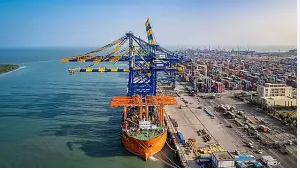
Washington: In a move with far-reaching geopolitical implications, the United States has announced it will revoke a crucial sanctions waiver that has allowed limited international investment in Iran’s Chabahar Port — a strategic maritime hub that has been central to India’s regional connectivity strategy.
The U.S. State Department confirmed on Thursday that the sanctions waiver, originally granted in 2018 under the Iran Freedom and Counter-Proliferation Act (IFCA), will officially expire on September 29, 2025. The waiver had permitted foreign participation in Chabahar, primarily to support Afghanistan’s reconstruction and facilitate humanitarian trade.
“With this revocation, individuals or entities operating the Chabahar Port or engaging in other activities covered under IFCA may be subject to U.S. sanctions,” the State Department said in a statement, reinforcing its policy of “maximum pressure” on Tehran over its nuclear and regional activities.
Setback for India’s Strategic Ambitions:
The U.S. decision is seen as a major setback for India, which has invested heavily in the development of Chabahar as a critical trade and transit point to Afghanistan, Central Asia, and Europe — bypassing Pakistan entirely.
In May 2024, India’s state-owned Indian Ports Global Limited (IPGL) signed a landmark 10-year agreement with Iran’s Iran’s Port & Maritime Organisation to operate the Shahid Beheshti terminal at Chabahar. The long-term deal replaced earlier annual contracts and signaled New Delhi’s deepening commitment to the project, backed by a $120 million investment and a $250 million line of credit for surrounding infrastructure.
Strategic Significance: Beyond Bilateral Trade:
Chabahar Port is a vital component of the International North-South Transport Corridor (INSTC) — India’s ambitious initiative to connect its markets to Central Asia, Russia, and Europe through Iran. The port also plays a counterbalancing role to China’s Belt and Road Initiative and Pakistan’s Chinese-backed Gwadar Port, located just 170 kilometers away.
India, Iran, and Afghanistan had previously signed a tripartite agreement in 2016 to transform Chabahar into a regional trade and transit hub. However, progress has been repeatedly hampered by shifting geopolitics and the threat of U.S. secondary sanctions.
Revocation Risks Regional Connectivity:
With the looming waiver withdrawal, analysts warn that Indian companies and institutions involved in the port may face exposure to U.S. sanctions — potentially freezing development and complicating logistics through Chabahar.
India has not yet issued an official response, but observers suggest the government may pursue diplomatic channels to seek exemptions, or explore alternative frameworks to shield its strategic investment.
As the deadline approaches, the U.S. revocation throws uncertainty over a project that has taken over two decades of negotiation and billions in investment. For India, Chabahar remains a geopolitical imperative — but the path forward may now require a more delicate balancing act between strategic interests and diplomatic risk.
Read More News On
Catch all the International News, Trending News, Breaking News Event and Latest News Updates on The BOL News
Download The BOL News App to get the Daily News Update & Follow us on Google News.




